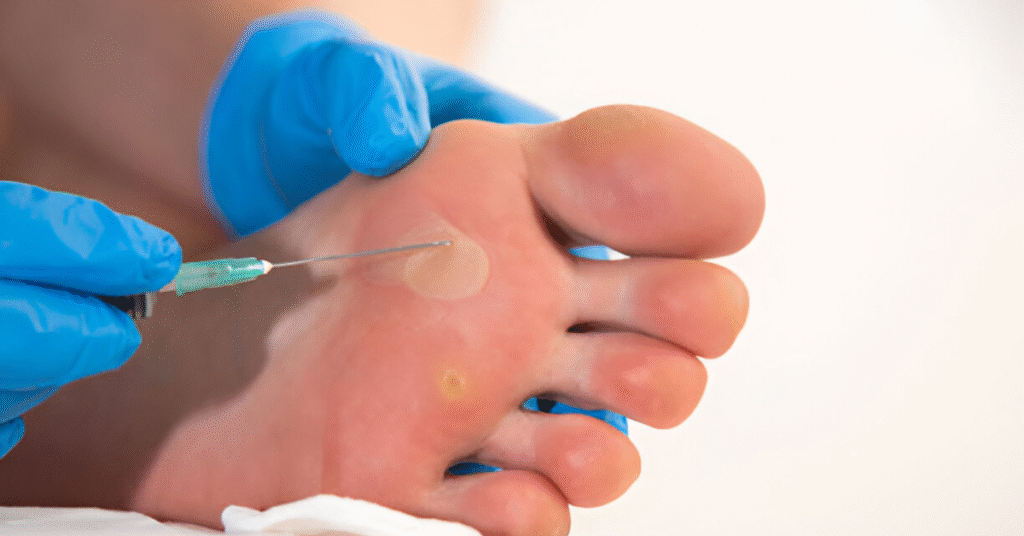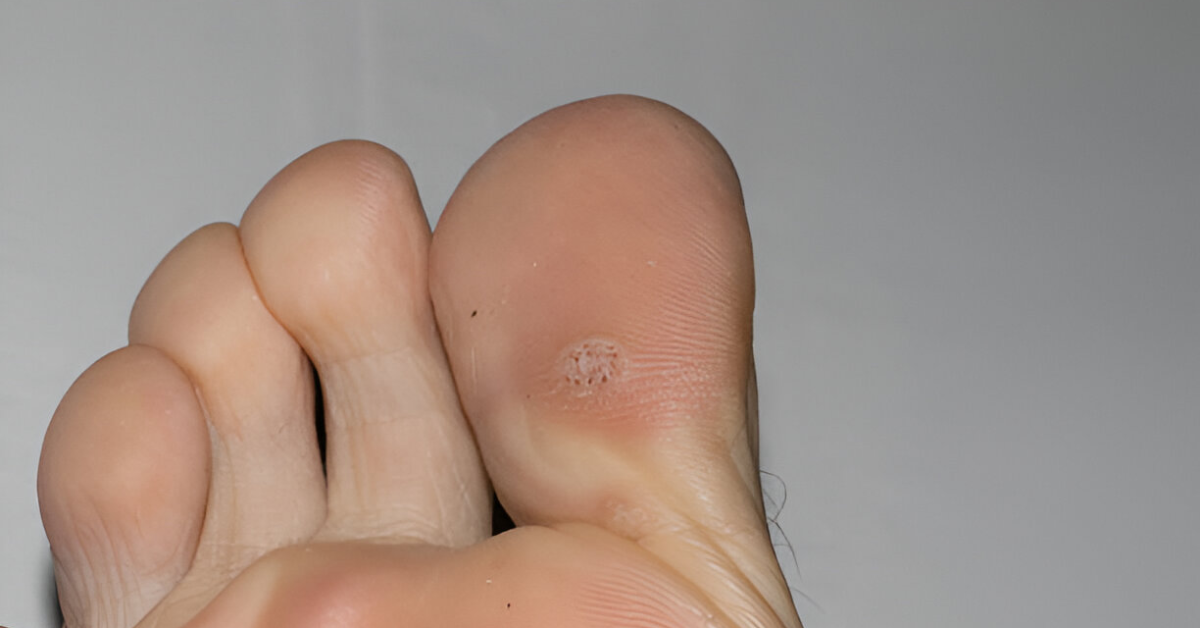If you’ve noticed a painful bump on the bottom of your foot, especially around the heel or ball of the foot, it might be plantar warts. These growths are common and can appear when you least expect them, especially after walking barefoot in public areas.
At Sole Foot and Ankle, one of the most common concerns we hear is: “Can plantar warts spread to others or to other parts of my own foot?” Let’s break it down.
Quick Facts
- Plantar warts are caused by human papillomavirus (HPV).
- They can spread in certain environments like gyms, public pools, saunas, and steam rooms.
- The virus enters the body through tiny cuts or breaks in the bottom layer of skin.
- Kids, teens, and those with weakened immune systems are more likely to develop them.
- While they often go away on their own, proper plantar wart treatment helps prevent spreading and recurring infections.
What Exactly Is a Plantar Wart?
A plantar wart is a small, grainy growth that forms on weight-bearing areas of the foot. Unlike warts on your hands or knees, these grow inward due to the pressure of standing and walking.
Common signs include:
- A rough bump with a hard surface
- A dark pinpoint (clotted blood vessels)
- Pain when walking or applying pressure
- Thickened skin that looks like a callus
What Causes These Growths to Appear?
Plantar warts come from specific strains of HPV, a virus that thrives in warm, moist places. It often spreads in public areas like:
- Locker rooms
- Swimming pool decks
- Shared showers
- Gym floors
- Saunas and steam rooms
The virus enters the skin through minor cuts, blisters, or softened areas, like those you might get after soaking your feet for a long time.
Can They Spread to Others?
Yes, but not through casual touch. Unlike cold viruses, plantar wart-causing HPV spreads indirectly.
You can contract the virus by:
- Walking barefoot in damp public spaces
- Sharing socks, shoes, or towels
- Using the same nail tools or pumice stones
- Touching your wart and then touching another part of your foot
Why Some People Get Plantar Warts and Others Don’t
Even if two people are exposed to the virus, only one might develop a wart. That’s because the immune system plays a major role.
People more likely to develop plantar warts include:
- Children and teenagers, due to developing immune defenses
- People with weakened immune systems, including those with autoimmune conditions or diabetes
- Anyone with frequent skin damage or foot trauma
How to Lower the Risk of Spreading
Whether you’re trying to protect yourself or others, here are ways to reduce your chances of developing or spreading these warts:
What to Do:
- Wear flip-flops in shared showers and pool areas
- Keep feet clean and completely dry
- Use a separate nail file or pumice stone for affected areas
- Cover the growth with medical tape or a bandage
- Disinfect foot tools after each use
- Wash your hands after touching your feet
What Not to Do:
- Don’t go barefoot in public facilities
- Don’t pick at the wart
- Don’t share socks, towels, or shoes
- Don’t use the same foot care tool on healthy and affected skin

Treatment Options That Actually Work
Some plantar warts disappear on their own, especially in healthy children, but others stick around and become painful. That’s when treatment helps.
Home Remedies (May Work for Minor Cases)
- Apple cider vinegar: Used as a soak or compress, though evidence is limited
- Salicylic acid: Available in over-the-counter pads or gels to soften the skin over time
Professional Plantar Wart Treatment at Sole Foot and Ankle
For stubborn, painful, or recurring warts, we offer:
- Cryotherapy with liquid nitrogen to freeze and destroy wart tissue
- Laser therapy to target the wart beneath the skin
- Prescription topical medications stronger than OTC products
- Minimally invasive procedures to remove deep or embedded warts
- Footwear evaluations and hygiene education to prevent re-infection
We also assess how your walking pattern (gait) might contribute to pressure buildup, which can encourage warts to linger.
When to See a Podiatrist
Make an appointment if:
- The wart causes pain when walking
- It’s not responding to home treatments
- It’s bleeding, spreading, or looks unusual
- You have diabetes or circulatory issues
- You’re unsure whether it’s a wart, corn, or callus
Early treatment prevents the condition from worsening or spreading to others.
A Note from Sole Foot and Ankle
Plantar warts aren’t dangerous, but they can cause real discomfort and frustration—especially if they linger. At Sole Foot and Ankle, we treat these growths with safe, effective methods tailored to your foot type and lifestyle.
If you suspect a wart or want expert advice, call our Valparaiso clinic at 219‑464‑9588 or schedule a visit online. We’re here to keep you active and comfortable.
Frequently Asked Questions
- Can you get plantar warts from a gym or public pool?
Yes. Warm, damp floors in gyms, pools, and locker rooms are ideal for the HPV virus. Always wear shower shoes or flip-flops. - What’s the best plantar wart treatment?
It depends on the case. Mild warts may respond to salicylic acid or home remedies, while deeper or painful warts may need cryotherapy or laser therapy. - How long do plantar warts last?
They can last several months to years if untreated. In children, they sometimes go away faster. - Is apple cider vinegar a reliable treatment?
It may help soften the wart but doesn’t work for everyone. For persistent cases, professional care is more effective. - Can plantar warts spread on my own foot?
Yes, especially if you scratch or pick at them. Always wash your hands after touching your feet, and cover the wart.



